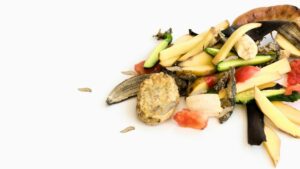BIOvative Magazin » Was ist die Biotonne?
Inhalte
Was ist die Biotonne?
- 21. Februar 2023
- Autor: Janine Friebel
- Lesezeit: 14 Minuten
Bioabfälle sind wertvolle Rohstoffe. Werden sie zum Beispiel in einer Biotonne von anderen Abfällen getrennt gesammelt, können sie zu Kompost verarbeitet werden. Dieser dient als Düngemittel und Bodenverbesserer. Damit leistet die getrennte Sammlung von Bioabfällen einen großen Beitrag zum Umweltschutz und schont den menschlichen Ressourcenverbrauch. Das haben auch gesetzgebende Instanzen erkannt. Deshalb gilt seit dem 1. Januar 2015 eine Pflicht zur getrennten Sammlung von Biomüll. Das wichtigste Instrument hierfür ist die Biotonne. Hier findest Du die wichtigsten Fakten dazu.
Die wichtigsten Fakten rund um die Biotonne
Organische Abfälle stellen etwa 30 bis 40 Prozent des Mülls dar, der in einem Haushalt anfällt. Die Biotonne ist das wohl effektivste Sammelsystem, um Biomüll in Privathaushalten getrennt sammeln und verwerten zu können. Als Biomüll versteht man alle tierischen und pflanzlichen Abfälle, die biologisch abbaubar sind. Die genauen Kriterien für biologische Abbaubarkeit haben wir in unserem Beitrag “Biologisch abbaubar, kompostierbar, biobasiert, recyclebar – Bedeutung und Unterschied” zusammengefasst.
Die Sammelsysteme für Biomüll
Es gibt drei verschiedene Wege, auf denen Biomüll gesammelt werden kann:
- die Biotonne: Organische Abfälle werden durch Privathaushalte in der Biotonne gesammelt. In diesem Kontext spricht man auch von Biogut. Einige Landkreise bieten hier aber auch die weniger praktische Alternative der Biotüte an, die von den Haushalten zu zentralen Sammelstellen gefahren werden muss.
- die direkte Anlieferung von Pflanzenabfällen: Viele Kreise bieten an, dass Privatleute oder Gewerbetreibende ihre Pflanzenabfälle direkt zur Deponie fahren können. In diesem Fall spricht man auch von Grüngutsammlung.
- die Sammlung aus Gewerbe und Industrie, die über eigene Großcontainer erfolgt
Dabei gibt es für die Biotonne – egal ob für privat oder Gewerbe – kein Standardmodell. Vielmehr sind unterschiedliche Sammelbehälter im Umlauf, abhängig davon, für welches System sich die Kommune entschieden hat.
Das Bundesministerium für Umwelt, Naturschutz und Reaktorsicherheit stellt an die Biotonne die Anforderung, dass es sich um einen möglichst dicht schließenden Behälter ohne Belüftung handeln soll. So soll der Befall mit Ungeziefer verhindert werden. Darüber hinaus sollte der Deckel geschlossen und der Behälterrand frei von Unrat sein.
In der Praxis werden aber deutschlandweit unterschiedliche Tonnen für die Sammlung von Biomüll genutzt.
- Die einfachste Variante ist der Standard-Müllgroßbehälter. Dieser wird auch für Restmüll oder Papier genutzt.
- Für die Grüngutsammlung sind oft Behälter mit Belüftung im Einsatz.
- Außerdem gibt es dicht geschlossene Behälter mit antibakterieller Beschichtung. Hierfür wird der Wirkstoff Triclosan in den Kunststoff eingearbeitet. So will man verhindern, dass sich Bakterien und Pilze an den Oberflächen im Inneren absetzen. Allerdings werden diese Behälter vor allem für den human- und tiermedizinischen Bereich empfohlen, da bei hoher Nutzungsrate das Risiko besteht, dass sich Resistenzen gegen das verwendete Triclosan entwickeln.
- Zudem sind vielerorts Behälter mit dicht schließendem Biofilterdeckel im Umlauf. Diese haben eine umlaufende Gummidichtung, die dafür sorgt, dass der Deckel besonders dicht schließt. Im Deckel selbst ist ein Biofilter aus Kokosfasern verbaut. In diesem Filter werden etwaige Geruchsstoffe durch Mikroorganismen abgebaut.Schimmelsporen werden außerdem in einem Wasserfilm eingeschlossen, weil Flüssigkeit durch die Deckeldichtung nicht verdampfen kann. Der Filter muss alle zwei Jahre ausgetauscht werden, kann aber bequem über die Biotonne entsorgt werden.
Wie groß ist die Biotonne?
Viele Kommunen bieten die Biotonne, wenn sie verfügbar ist, in unterschiedlichen Größen an. Das hängt oft vom Verwendungszweck (Privathaushalt oder Gewerbe) und von der Größe der nutzenden Einheit ab. Also beispielsweise davon, mit wie vielen Personen Du die Biotonne gemeinsam nutzen willst. Die Tonnengröße für die Biotonne wird dabei immer in Litern angegeben, weil das Fassungsvermögen die ausschlaggebende Größe ist. Mögliche Tonnengrößen sind:
- 60 Liter
- 80 Liter
- 120 Liter
- 240 Liter
Diese Farbe hat die Biotonne
Die Farbe Deiner Biotonne ist von Kommune zu Kommune unterschiedlich. In einigen Orten ist die Tonne braun, in anderen grau oder schwarz mit einem grünen Deckel. Das Design wird von den Müllentsorgern selbst festgelegt.
Was darf rein in die Biotonne?
In der Biotonne darfst Du Biomüll tierischer oder pflanzlicher Herkunft entsorgen, der biologisch abbaubar ist. Das bedeutet, dass er durch Mikroorganismen, Enzyme oder über den Boden übertragbare Lebewesen zersetzt werden kann. Generell trifft das für die meisten organischen Abfälle aus der Küche oder dem Garten zu, also beispielsweise Obst- und Gemüsereste, gekochte Lebensmittelreste und Gartenabfälle wie Laub oder Rasenschnitt.
Was genau in die Tonne darf, hängt im Detail von der Abfallentsorgungssatzung ab, die in Deiner Heimatgemeinde gilt. Im Detailartikel “Was darf in die Biotonne? Ein kurzer Überblick” bringen wir anhand von Beispielen Licht ins Dunkel.
Über die Biotonne nicht entsorgt werden dürfen Abfälle, die nicht biologisch abbaubar sind oder die das Pflanzenwachstum negativ beeinträchtigen können.
Ist die Biotonne verpflichtend?
Seit dem 1. Januar 2015 schreibt das Kreislaufwirtschaftsgesetz die getrennte Sammlung von Bioabfällen vor. Das bedeutet, dass die Biotonne selbst nicht konkret vorgeschrieben ist. Allerdings hat sie sich als das effektivste Mittel zur Sammlung von Bioabfällen erwiesen.
Die Pflicht zur getrennten Sammlung von Biomüll erschließt sich aus dem Verwertungsgebot. Dieses sieht vor, dass Abfälle verwertet statt beseitigt werden müssen, wenn für das Verwertungsprodukt ein Markt vorhanden ist und die Verwertung wirtschaftlich ist. Da Biomüll unter geringen Kosten kompostiert wird und Kompost in der Landwirtschaft und im Gartenbau zum Einsatz kommt, ist die Verwertung nach dem Kreislaufwirtschaftsgesetz gesetzlich festgelegt.
Falls Du nachweisen kannst, dass Du all deine organischen Abfälle aus Küchen und Garten durch Deinen eigenen Kompost verwerten kannst, kannst Du Dich von der Biotonne befreien lassen. Die konkreten Voraussetzungen dafür und den nötigen Antrag bekommst Du bei Deiner Heimatgemeinde.
Die Verbreitung der Biotonne
Laut Bericht des NABU liegt der Bundesdurchschnitt der in Deutschland gesammelten Bioabfälle bei etwa 60 Kilogramm pro Kopf. Dabei variieren die tatsächlich gesammelten Mengen an organischen Abfällen, je nachdem, ob die Biotonne in den jeweiligen Kreisen und Gemeinden verpflichtend ist oder ob die Sammlung nur auf freiwilliger Basis angeboten wird.
Vom NABU erhobene Daten aus dem Jahr 2018 zeigen, dass die Mengen an getrennt gesammelten Bioabfällen im Westen Deutschlands wesentlich deutlich höher sind als im Osten. Außerdem bot im Jahr 2020 fast jeder siebte Landkreis in Deutschland die Biotonne nicht flächendeckend an. Das bedeutet, dass die Tonne nur in ausgewählten Mitgliedsgemeinden verfügbar war.
In 15 von 402 Landkreisen und kreisfreien Städten wird die getrennte Sammlung von Biomüll immer noch gar nicht angeboten.
Warum gibt es die Biotonne nicht überall?
Dass es die Biotonne nicht überall gibt, liegt daran, dass die konkrete Sammlung des Biomülls vor Ort in der kommunalen Abfallentsorgungssatzung geregelt wird. Das Kreislaufwirtschaftsgesetz schreibt zwar bundesweit die Pflicht zur getrennten Sammlung von Bioabfällen vor. Aber im Sinne des Föderalismus obliegt die konkrete Umsetzung allerdings den Kommunen selbst. Inwiefern die Pflicht zur getrennten Sammlung von Bioabfällen umgesetzt wird, kontrolliert außerdem jedes Bundesland eigenständig. Das heißt: Die Zuständigkeiten sind derart aufgegliedert, dass im Grunde alle machen können, was sie wollen.
Das führt dazu, dass vor allem in ländlichen Regionen Getrenntsammlung noch nicht umgesetzt wird oder die Sammlung nur über ein Bringsystem erfolgt, das von der Bevölkerung nicht gut angenommen wird. Immerhin ist es ja viel bequemer, den Müll einfach in die Tonne zu werfen, als ihn noch wegfahren zu müssen.
Was passiert mit dem Biomüll?
Werden die organischen Abfälle über die Biotonne gesammelt, können sie im entsprechenden, lokalen Entsorgungswerk weiterverarbeitet werden. Hierfür gibt es zwei Wege:
- In Kompostierungsanlagen wird aus dem Biomüll Kompost oder anderer organischer Dünger hergestellt. Kompost kann als organisches Düngemittel oder als Bodenverbesserer dienen und ist sowohl in der Landwirtschaft als auch im Garten- und Landschaftsbau sowie in privaten Gärten sehr beliebt, um Zier- und Nutzpflanzen zu unterstützen.
- Es gibt aber auch die Verwertung von Biomüll in Biogasanlagen. Dort werden die Bioabfälle vergoren. Dabei entsteht Biogas, welches zur Stromerzeugung oder für die Wärmeerzeugung genutzt werden kann. Die übrig gebliebenen Gärreste werden wiederum als organische Düngemittel weiterverwertet.
Maden, Gerüche & Co: Die Biotonne reinigen
Nicht alle Menschen sind gleichermaßen Fans ihrer Biotonne. Vor allem im Sommer verbinden die meisten Leute Dinge wie Gestank, Schimmel oder sogar Maden mit der Biotonne. Das liegt einfach auch in der Art der Abfälle begründet: Vor allem Küchenabfälle faulen schnell, was zu schlechten Gerüchen und Schimmel führt.
Das Problem lässt sich am besten in den Griff kriegen, wenn es erst gar nicht entsteht. Dafür ist die gründliche Reinigung der Biotonne essenziell. So geht’s:
- Wasche die leere Biotonne direkt nach der Leerung mit warmem Wasser und etwas Spülmittel.
- Hartnäckige Rückstände lassen sich mit einer Bürste abschrubben. Kleiner Trick: Verwende eine Klobürste, damit kommst Du auch gut in die Ecken.
- Gieße das Wasser aus, am besten auf einer Grünfläche.
- Dreh die Tonne zum Trocknen am besten auf den Kopf.
- Benutze die Biotonne erst wieder, wenn sie komplett getrocknet ist.
Gerüche in der Biotonne vermeiden
Ob die Biotonne stinkt oder nicht, ist oft auch eine Standortfrage. Steht die Tonne in der Sonne, dann wird sie warm. Die Wärme im Inneren beschleunigt wiederum die Fäulnis- und Zersetzungsprozesse. Das sorgt für üble Gerüche. Achte deshalb darauf, dass Deine Biotonne
- trocken
- schattig
- vor Frost und Wind geschützt untergebracht ist.
Ein weiterer Tipp, um üble Gerüche in der Biotonne zu vermeiden, ist, die Menge an freier Feuchtigkeit direkt so gut wie möglich zu reduzieren. Das gelingt vor allem dadurch, dass Du
- Lebensmittelabfälle in Küchen- oder Zeitungspapier einschlägst
- den Boden Deiner Biotonne mit ein bisschen Papier oder gelöschtem Kalk aus legst
- Rasenschnitt und andere Grüngutabfälle erst einmal antrocknen lässt.
Achte außerdem darauf, dass Du den Deckel der Biotonne stets geschlossen und den Rand der Tonne sauber hältst, um kein Ungeziefer anzulocken.
Außerdem kann es helfen, Deine Biotonne mit Hausmitteln zu behandeln, die üble Gerüche fernhalten. Dazu gehören:
- Essig
- Natron
- Vanille-Essenz
- Kaffeepulver
- Zitrusschalen
- Pfefferminzextrakt
Was mache ich gegen Maden in der Biotonne?
Maden in der Biotonne sind eine wirklich eklige Angelegenheit. Deshalb solltest Du sie von vornherein verhindern, indem Du tierische Abfälle immer in Küchenpapier oder Zeitung einwickelst. Fliegen legen ihre Eier nämlich mit Vorliebe auf proteinreiches Ausgangsmaterial. Achte außerdem darauf, dass der Deckel Deiner Biotonne gut verschlossen ist, damit die Fliegen erst gar nicht in Deine Tonne gelangen können.
Sind die Maden trotzdem da, helfen Wasser, Salz und Essig am besten. In unserem Artikel “Maden in der Biotonne – Was tun?” erklären wir Dir Schritt für Schritt, wie Du vorgehen musst.
Ob schlechte Gerüche, Maden oder Schimmel: Am einfachsten helfen Dir übrigens kompostierbare Biomüllsäcke, diese Probleme in den Griff zu kriegen, bevor sie entstehen können.
Schimmel in der Biotonne vorbeugen
Schimmel in der Biotonne ist nicht nur unangenehm – er ist durchaus auch ein Problem. Denn Schimmelsporen können über den Kompost wieder in den Garten gelangen und dort im Zweifel Schaden anrichten. Deshalb solltest Du Schimmel in der Biotonne von vornherein vermeiden. So gelingt das am besten:
- Suche einen trockenen, schattigen und kühlen Stellplatz für die Biotonne. Schimmelsporen lieben nämlich ein warmes und feuchtes Klima.
- Verhindere, dass sich zu viel Feuchtigkeit in der Biotonne sammelt. Das gelingt auf zwei Wegen: Du kannst den Tonnenboden mit Papier oder gelöschtem Kalk auslegen. Beides bindet die beim Faulprozess entstehende Feuchtigkeit. Außerdem kannst Du stark wässernde Abfälle in etwas Papier einschlagen.
- Entsorge bereits schimmelnde Lebensmittel lieber über den Restmüll statt über die Biotonne.
Saubere Biotonnen dank Beuteln von BIOvative
Für uns und die Umwelt ist die Biotonne ein echter Erfolg, weil die Pflicht zur getrennten Sammlung von Biomüll so einfach umzusetzen ist. Wenn Du einige Kleinigkeiten beachtest, muss die Biotonne dabei auch gar keine unangenehme Sache sein. Am einfachsten fällt ein guter Umgang mit Biomüll mit kompostierbaren Biomüllbeuteln, wie Du sie bei BIOvative bekommst. Unsere Produkte sind innerhalb von sechs Wochen zu 100 Prozent kompostierbar und wurden dafür mit dem DINPlus, dem Keimling und den OK compost Zertifikaten HOME und INDUSTRIAL ausgezeichnet. Du darfst die Biobeutel also bedenkenlos dafür verwenden, um Deine Biotonne damit auszukleiden.
Melde Dich am besten direkt für unseren Newsletter an und folge uns auf unseren Social Media Kanälen! So verpasst Du keine Produktneuheit und erhältst hilfreiche Tipps für Deinen Alltag.

Janine Friebel

Janine Friebel
Diese Artikel könnten Dich auch interessieren

Neues Biomüll-Gesetz 2025: Was sich für Dich ändert
Ab dem 1. Mai 2025 tritt in Deutschland eine neue Verordnung in Kraft, die die Entsorgung von Biomüll strenger regelt. Ziel ist es, die Qualität des Biomülls zu verbessern und die Umweltbelastung durch Fremdstoffe zu reduzieren. Doch was bedeutet das konkret für Dich als Verbraucher:in?

Maden in der Biotonne: Was tun?
Die Biotonne ist praktisch, umweltschonend – und im Sommer willkommenes Zuhause für allerlei Ungeziefer. Deshalb haben wir wertvolle Tipps zusammengestellt, die zeigen, was Du gegen Maden in der Biotonne tun kannst.

Zeitungspapier
Grundsätzlich ist Zeitungspapier biologisch abbaubar und kann daher auch in geringen Mengen in die Biotonne geworfen werden.

